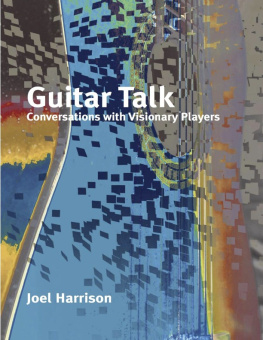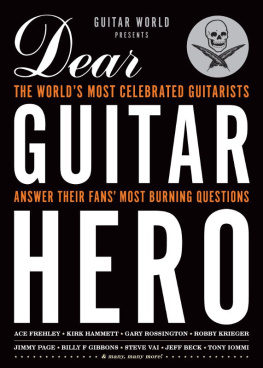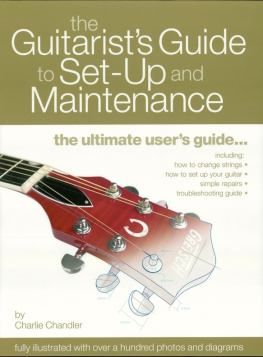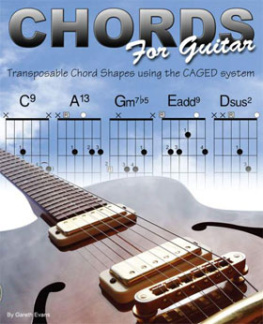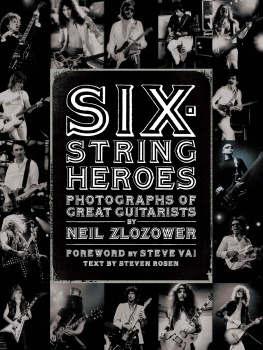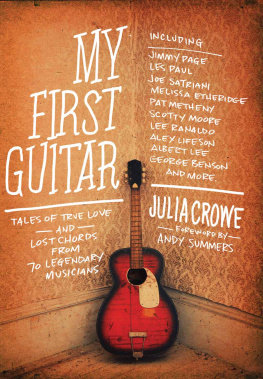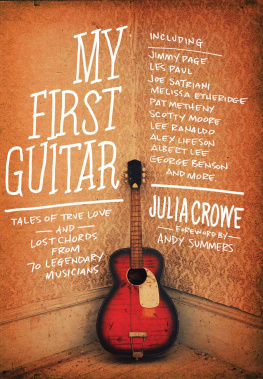GUITAR TALK
Joel Harrison
GUITAR TALK
Joel Harrison
2021
2021 by Joel Harrison
ISBN: 978-1-949597-14-1 ebook version
Library of Congress Control Number: 2020950615
All rights reserved.
published by:
Publisher: David Rothenberg
Editor-in-Chief: Evan Eisenberg
Designer: Martin Pedanik
Photographs by: Scott Friedlander
Cover by: Bernhard Wstheinrich
Proofreader: Tyran Grillo
Set in Arno
printed by Tallinn Book Printers, Tallinn Estonia
www.terranovapress.com
Distributed by the MIT Press, Cambridge, Massachusetts and London, England
To the memory of Vic Juris
"cover-40" class="s13 s14 c2">Foreword>


Foreword
Capturing the spirit of a musical community is a tricky but essential endeavor.
Delineations of style and geography are just the beginning; one must also seek the conceptual, spiritual, and creative through lines that connect all musicians. These paint a bigger and more honest picture of what fuels artistic mastery.
Seeing the guitarists featured in this book as multidimensional, eloquent individuals is critical, and reflects the way I know them to be. In addition to being absolute masters of their instruments, they have all laid the groundwork for what it means to be a modern creative force.
I look to these players as teachers. They have shown what it means to be grounded in humanityto be someone who cultivates mastery of the instrument as a means of bringing beauty and healing to the world.
There is also something very special about musicians speaking with one another. It brings about a certain candid intimacy, free of interpretation, that is essential for portraying their true nature. Joel Harrison is uniquely equipped for this task, as he himself is a master of the instrument and a true artist who brings deep intelligence and curiosity to every conversation.
As a fan and student of the guitar, I have spent much time projecting what I thought my heroes were thinking or driven by. There is nothing more exhilarating than hearing the truth from them directly. It seems a players experience is only one piece of the puzzle; the other piece is how they interpret their life experience and how they unpack it.
I am fond of saying that the guitar community is wonderfulwe tend to look out for one another and support each other with kindness and curiosity.
The players in this book are my guiding lights and it fills my heart with joy and gratitude to see their words collected so accurately, with such care and celebration. I am deeply honored to be included in this volume and I invite anyone who is interested in the humanity of artists to read on.
Julian Lage

d_r0
Introduction
The guitar is the instrument of our time. For decades it has driven a vast quantity of classic American music in the realms of country, blues, rock, and R&B, where its role has been exhaustively documented. Less chronicled is the explosion, since the 1960s, of creative, renegade guitar playing in jazz, avant-garde, and new-music contexts.
This book celebrates the enormous range of approaches and sounds encompassed by the modern guitar, which by now can do almost anything.
It can howl, scrape, scratch, scream, sing, pluck, and soothe. Its a rhythm machine, a soundscape generator, a delivery system for the most assaultive volume and the most delicate harmony. In jazz contexts, especially since the early seventies, it is now an institution, and there are more and more classical composers incorporating it into their works.
To quote Whitman, the guitarists in these pages contain multitudes. We might say a good number are jazz-based, but the guitar is quite the chameleon in the twenty-first century, and jazz carries a variety of definitions. What we can safely say is that all these players are professional improvisers. Many have roots that extend every which way, whether into rock, noise, country, blues, or traditions from other cultures. Its fascinating how each individual assesses and incorporates what surrounds them. As trumpeter Lester Bowie said, the jazz tradition is creativity. Its innovation. So Ive tried to choose innovators.
We live in a time of great amalgamation in which once separate tribes, languages, and customs are all rubbing up against each other, creating friction, tension, beauty, possibility. Its those players who are most freeeven adriftin this vast landscape who most interest me.
My relationship to this subject is intimate. A lifelong guitarist and composer, I grew up listening to some of these guitarists, met others later, and have shared the bandstand with more than a few. Most are acquaintances, some are friends. As the founder of the Alternative Guitar Summit, a forum for new and unusual approaches to the guitar that is now in its tenth year, I continually have my eye on the landscape, searching for newor perhaps reimaginedcontexts for my instrument. After fifty years of playing Im still a fan. Who can fail to be amazed at a universe that has produced both Jerry Garcia and Jim Hall, Derek Bailey and Pete Townshend, Pete Cosey and James Taylor, George Benson and George Thorogood? The possibilities are still limitless.
I began to play at age nine. Luckily my parents made me learn classical guitar, which I studied for many years while absorbing the rock and folk music of the era. As was true of so many people my age (I was born in 1957), The Beatles consumed my adolescent imagination in the early 1960s.
The movie Woodstock liberated me. I became obsessed with The Who, The Grateful Dead, The Allman Brothers, Hendrix, Yes. I also learned plenty about bluegrass, country music, R&B, and blues.
Having experienced the joys of improvisinga pleasure that for me is as deep as any in creationI inevitably turned to jazz. Rocking out was not enough: I had to figure out what Wes Montgomery, Miles, and Coltrane were doing. The guitar seemed political at the timePeter, Paul and Marys intricate arrangements of protest songs; Dylan, of course; Jimi playing The Star Spangled Banner; Curtis Mayfield playing People Get Ready; Miles Davis with his two-guitar groups. I know this sounds naive, but its surprising to me that anyone would have wanted to play an instrument that wasnt the guitar back then.
From there, a deep study of classical composition, explorations of African and Indian music, and immersion in the so-called avant-garde culminated in my first CD, 3+3=7 , a wild affair that featured three guitarists and three percussionists. These days I consider myself as much a composer as a guitarist, but the guitar still shapes much of what I do.
The guitar is a town square where folks of all sorts can meet up and share news. Among the most international of instruments, it is inarguably the most American, offering an arena in which so much of who we are as a nation is brought to life. The players in this book pursue variegated paths, seek worlds within the instrument that never existed before. They steer clear of the primping and posing that stands for artistry in the consumer world. If they did achieve fame it was by means of brilliance, vision, hard work, and a deep humanity. Playing the guitar the way these folks do is terribly hard. Believe me, I know. The countless hours of practice, the unending dedication, the choice to live at the fringes its deeply inspiring.

